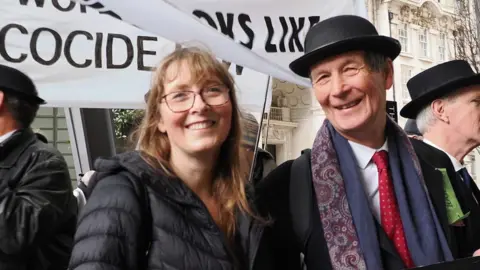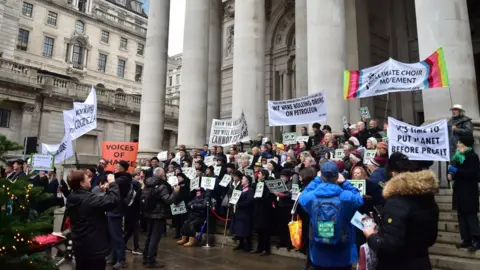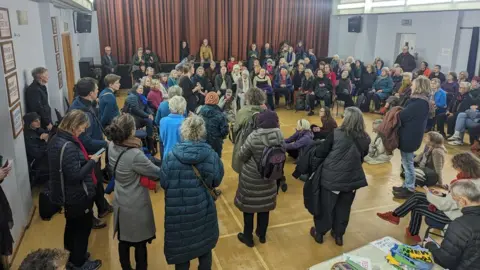Climate Choir movement: Using melody for protests
 Andy Squiff
Andy SquiffA woman who started a climate choir has said they are trying to change people's "hearts and minds" about the climate crisis through singing rather than shouting.
Jo Flanagan, 61, from Bristol founded the Climate Choir Movement, which has now spread to include 11 other choirs across the UK.
The choirs aim to disrupt events by turning up uninvited to sing messages of climate protest.
More than 700 people have now joined.
Ms Flanagan helped the movement form in January 2023, and it has now expanded to include Portsmouth, Sheffield and Northern Ireland.
She said the group had "hit a nerve" with people who wanted to protest, but did not want to get arrested.
She explained the idea had struck her when she watched a group of Americans standing up and singing God Bless America with alternative words during a conference.
She said: "They walked out singing in harmony with such dignity that I thought 'that is the way to do it'."
Ms Flanagan's first singing action was as a member of Extinction Rebellion, disrupting HSBC's AGM in April 2022.
"It was hard work in the beginning but it grew and grew - we got 30 singers singing in four parts, a version of Abba's Money, Money, Money for that first time."
'Singing is healing'
Then Ms Flanagan realised she wanted to do more, which led to the first Bristol climate choir being born.
It was officially founded in January 2023, and by the following year the movement had 12 choirs totalling 700 singers, including one in Ballycastle in Northern Ireland.
The Climate Choir Movement holds six large-scale protest actions a year, Ms Flanagan said.
On 7 March more than 150 singers protested against the government's decision to allow drilling of the Rosebank oil field at the Palace of Westminster, singing a reworking of the Hallelujah Chorus in St Stephen's Hall.
 Richard Baxter
Richard BaxterMs Flanagan said: "I think we've hit a nerve here. There are a lot of people who think there is something not quite right with nature - they might be gardeners like myself, and you realise there are very few insects.
"Not everyone wants to be a climate activist and I get that, some environmental activism can be quite alienating."
A spokesperson for UK Parliament said: "The group, who had accessed legitimately and in line with usual processes, briefly gathered and began singing in St Stephen's Hall.
"Although no offence or disruption was caused, this activity was in contravention of the House's rules on access. The individuals were asked to leave and immediately did so."
'People across the spectrum'
Ms Flanagan said: "We are one part of a jigsaw of the environmental movement, we do need the courageous people who would risk their freedom but we also need to have a place for people who aren't activists so much."
The protests have been known to cause a stir, including a flash singing mob in the Science Museum in London in October, and 400 singers singing at an environmental protest in London in April 2023.
"We try and change hearts and minds through singing rather than shouting," she added.
Jean Pollard, 69, from Bristol, a former social worker, said the good thing about the group was it contained all different types of people.
"It is people across the spectrum that have come together, from all different political parties too," she said.
She said she had joined because she liked singing but also wanted to express concern about the climate.
"At first, I joined because I do like singing, but it is singing with a purpose and I have been very concerned about the situation, and angry and disappointed with the government," she said.
Ms Pollard added that she was singing for her grandchildren, because she was fearful for their future.
 Duncan Appleby
Duncan ApplebyAt their recent Bristol rehearsal, more than 100 people gathered, both in person and over Zoom, to be led by choirmasters and musicians.
They sing well-known songs such as the Spice Girls' 'Stop Right Now' with new lyrics, or have new pieces composed for them.
Duncan Appleby, 35, a music teacher from Guildford, set up a climate choir there in November and has already found 10 members.
He said: "I was looking for a way to connect my climate concerns with my musical life."
'Lovely way of healing'
Mr Appleby said the "contradiction" between the beautiful singing and the protest words meant the choir's message was really sinking in.
"It is so powerful, it's this art that we are bringing into these spaces," he said.
Ms Flanagan added: "Singing together is a lovely way of healing, there is such a lot of love in the room.
"There is something about singing that can reach deep down, if you can sing the words with enough soul and heart, there is something about singing that can reach people in a way that if you're just shouting it doesn't have the same impact."

Follow BBC Bristol on Facebook, X and Instagram. Send your story ideas to us on email or via WhatsApp on 0800 313 4630.
